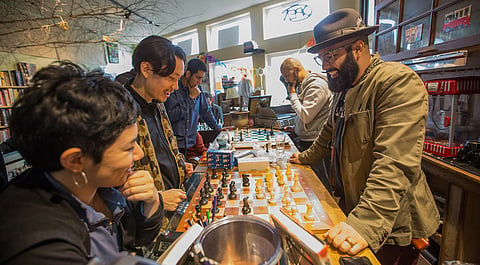Estelita's Library Starts People's Chess Club
by Carolyn Bick
It's crowded in Estelita's Library on this late January day. Amidst the stacks of books tucked into the small, cozy space, brows crinkled in concentration, players move plastic chess pieces across checkered battlefields towards victory — or defeat.
Estelita's Library hosted the inaugural People's Chess Club Jan. 20 (The next session is March 16 at noon). Players novice and adept filled the space, which is normally a specially curated nonprofit social justice library. Library owner and founder Edwin Lindo said he decided to create the club because of the role chess played in his own life when he was growing up in San Francisco.
"Fundamentally, it has formed me. My dad made sure that, foundationally, when we moved in this world, especially as people from a marginalized community, we have to be incredibly strategic about how we move, because a lot of times, we only get one chance," Lindo said.
Lindo remembers his father would play with friends for six hours at a time, "and it would bleed into one, two in the morning." He wouldn't let the young Lindo participate until he fully understood the rules.
"It was their ritual and their ceremony, and a culture-building exercise that I think brings people together, and it doesn't have to require a certain skill level," Lindo said.
At the same time, Lindo acknowledged that chess can seem to be a "very pretentious" board game, conjuring up images of smoky rooms filled with stern-looking old, white men sitting in ancient mahogany chairs. But to him, it's a communal game, one that's played in city parks throughout the country, and one that anyone can learn and enjoy, no matter their background.
"There is no novice level. It's are you willing to play, are you willing to learn, are you willing to teach?" Lindo said. "We think that folks in underserved and marginalized communities also should have access to this wonderful game."
Most historians believe game of chess has its earliest roots in India. The version globally played today has been Europeanized, with a broader range of pieces and movements. Still, the goal remains the same: out-think your opponent, before they out-think you. This takes patience and dedication, and requires the ability to think strategically and critically, Lindo said, both of which the library as an institution strives to get its patrons to do. Chess is just another way to help them do that.
Lindo said there is no such thing as a bad player. If someone believes they don't have what it takes to play the game, it's because they just haven't had the right teacher or encouragement. To that end, he cautioned against anyone coming into the People's Chess Club purely to prove themselves an indomitable player. That's not what the club is about, he said.
"The beauty of chess is that it doesn't matter how big, it doesn't matter how strong, it doesn't matter how much you weigh, it doesn't matter — anything, except, do you know how to move these pieces in a way that you can checkmate that person's king," Lindo said. "And that's an equalizer."
📸 Featured Image: Estelita's Library curator Edwin Lindo, right, plays chess, during the first meeting of the People's Chess Club at Estelita's Library on Jan. 20, 2019. (Photo: Carolyn Bick)
Help keep BIPOC-led, community-powered journalism free — become a Rainmaker today.


